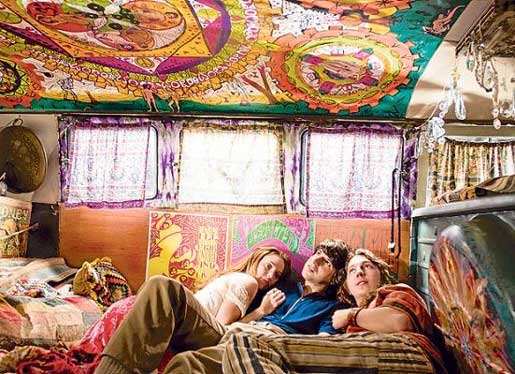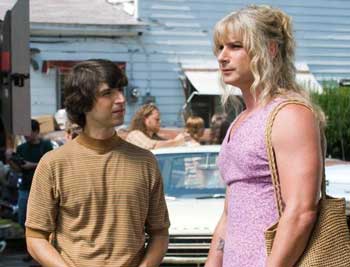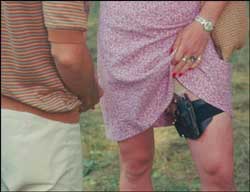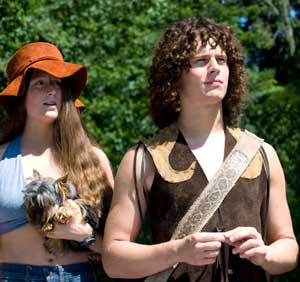
It's summer, and time to go down to Yasgur's farm again -- this August will mark the 42nd anniversary of the Woodstock music festival. There's nothing notable about that milestone except we're still getting older, and Ang Lee's 2009 dramedy Taking Woodstockis running all summer long on HBO.
It's an engaging, historical romp through the counterculture of the '60s, from its core gravitas to its downright silliness. And all the while, it dances around the edges the festival, without ever pushing to the stage and laying eyes on a rock star.
Based on Elliot Tiber's book of the same name, Lee's film (which premiered at the 2009 Cannes Film Festival, and was nominated for the Palm d'Or) has a somewhat maddening, but tantalizing conceit: Most of the film occurs at the Tibers' dilapidated Catskills motel, The El Monaco, near Max Yasgur's dairy farm where the show is.
From there, you can vaguely hear the music start on Aug. 15, 1969, far in the distance, like a mythical beast being born and wailing.

And that's the wonderful thing about it. As Tom Stoppard did in Rosencrantz and Guildenstern Are Dead (about the duo offstage during Macbeth), and like the Broadway hit Wicked (backstory, then offstage reinvention during The Wizard of Oz), Lee has made another play outside the play. It's a place where Tiber (played by Demetri Martin, at right with Liev Schreiber), at the center of his memoir, falls first overwhelmed, then unavoidably charmed, and finally changed by the hippie army of 500,000 that has overrun the town for the festival.
Not only does Elliot finally turn on, and tune in, but comically, so do his Eastern European immigrant parents -- two Russian Jews here named Teichberg who emigrated before the war. They're still considered outsiders, even in the Catskills.
As such, it's a light, shorthand look at second-generation Jews in America, and their drift away from their parents' diaspora -- when freedom gives them the opportunity to find themselves, often to their parents' dismay.
Taking Woodstock steps lightly around the war and its character with PTSD, before there was a name for it. Mostly, you're free to be. Acceptance is the thing, and in that impromptu, idyllic world over three days, everyone gets it. The whole event, with woefully inadequate security by today's standards, happened pretty much incident-free.

Perhaps in part because of Schreiber's fictional character Vilma, a former marine sergeant, turned transvestite in a blond wig and a garter holster under his dress. He's running security at the motel for the family, and becomes somewhat of a mentor for Elliot.
Schreiber's character is a grand analogy for the times -- an oddball mashup of male power, feminine discourse, and Athena, Goddess of War, all rolled into a mighty and fearless entity. As offbeat and maybe as mixed-up as the entire festival itself, he embodies (literally) both sexes and perhaps a whole generation that dared to cross societal boundaries in which they'd thought they were going to be trapped for life.
There are other fun moments here such as when concert promoter Michael Lang (Jonathan Groff) descends into Bethel, N.Y., by helicopter, an Adonis with a flowing mane of pre-Gino Vannelli curls, leather vest and shoulder bag. (The festival actually occurred in Bethel, with Woodstock 43 miles to the northeast.)

As the brains beyond the operation, he's inscrutable, surfing the local obstacles and speaking in indirect visionary quips, leaving Elliot to ponder the true meanings, if they indeed are there at all.
Paul Dano and Kellie Garner [photo at top] also shine as the androgynous VW van couple that help Elliot envision his big step away from his self-made chains in the Catskills. And so does Eugene Levy as conservative Jewish farmer Max Yasgur, who sees something special in the kids and their spirit, where most of the locals see irresponsible, mindless dropouts.
Taking Woodstock is a charming period piece, excavating a convincing mix of the clothing, language and political winds of the time, in all of its well-meaning, non-violent innocence. But it also smartly looks back on the same material through a contemporary lens. We get a sense of these seeds of social change, and how our current cultural fragmentation was born.
Lee's vision of the festival's sea of humanity is finally revealed at night -- a human pool down in the basin of Yasgur's field, glowing in stage light, elliptical, swirling, with cobalt heaven above, a primordial, cosmic birth of transcendence.
It's maybe a mythical place where social revolution finally gathered in one place for a moment, even if it eventually collapsed under its own naivete.
Like most latecomers, via Lee's film, we settle for a seat way, way in the back. But no less the better for it.
[Imminent airings of Taking Woodstock -- Thursday, June 16 at 3:40 a.m. ET on HBO, plus 9:40 a.m. ET on HBO Zone; Saturday, June 18 at 7:40 a.m. ET on HBO Zone; and most conveniently, Tuesday, June 21 at 8 p.m. ET on HBO Signature.]